Andreas Fux | Стыд и Красота - Ausstellung Berlin
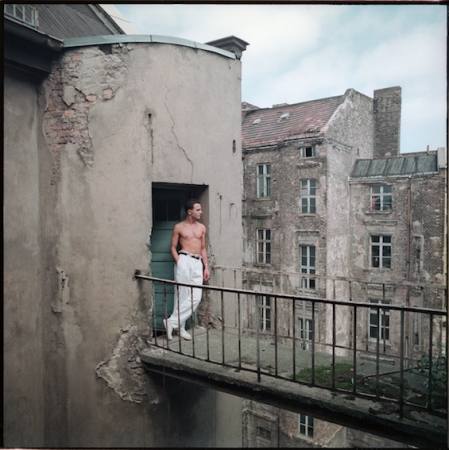
Ausstellung Galerie Galerie cubus-m
Datum: 30.01.2016 - 05.03.2016
Künstler: Andreas Fux
Veranstalter & Ort:
Galerie Galerie cubus-m
10785 Berlin
Pohlstraße 75
Der Mann lehnt in einem Türrahmen hoch oben zwischen den Fassaden von Berlin. Weiße Hose, weiße Schuhe, ohne Hemd, ein Kettchen um den Hals verkörpert er eine Jugend, die im Kontrast steht zu den runzeligen, schorfigen Häusern, die seit einem halben Jahrhundert auf Sanierung harren. Sie bedeuten Stillstand, während der junge Mann in eine für uns noch unsichtbare Zukunft blickt.
Heute können wir zurückblicken und sehen die Szenerie mit anderen Augen. Der Stillstand, der damals vielleicht lähmend erschien, hat etwas Versöhnliches und Wehmütiges angesichts jener Zukunft, die dreißig Jahr später auch schon Vergangenheit ist und die die einst ersehnte Sanierung brachte, die alles verändern sollte. Das Bild war damals Lebensgefühl einer neuen Generation, heute ist es historisch.
Von dieser Fotografie zu den aktuellen Studioaufnahmen von Andreas Fux ist es ein langer, aber konsequenter Weg. Den fast zärtlichen und respektvollen Umgang mit dem Gegenüber hat er sich bewahrt, doch die scheue Annäherung ist einem anderen Grundgefühl gewichen, dass sich als kalkulierte Ekstase beschreiben lässt.
Seine Sitzungen, in denen er seine Modelle in sanfte Helligkeit taucht, dauern ganze Nächte, werden akribisch Vorbereitet, gehen in sensibilisierter Hochspannung über die Bühne und folgen einer Dramaturgie, bei der Überraschungen eingeplant sind, auch wenn der Fotograf nebenbei versucht, die Bilder, die ihm vorschweben, Realität werden zu lassen.
„Ich bin ja so gar nicht gläubig, aber diese Treffen haben etwas Heiliges jenseits der Religion.“ Es klingt vielleicht ein wenig pathetisch, wenn Andreas Fux so von den Begegnungen spricht, denen er, in ein wenig nervöser Erregung, entgegensieht, aber das ist in Wahrheit die präziseste Beschreibung dessen, was sich ereignet. Er löst die Menschen aus ihrem Umfeld, stellt sie ‚frei‘ und ist bestrebt, nicht nur den Raum, sondern weitestgehend auch die Zeit aufzuheben.
Oft über Jahre begleitet Fux seine Modelle, die sich vor seinem Objektiv verwandeln, altern und die neuen Tätowierungen beiläufig präsentieren. Beiläufig, weil meist weit mehr passiert als nur die Abbildung eines Status quo. Denn die Fotografien sind Ergebnisse von Performances, die nicht nur Bilder, sondern auch Gefühle transportieren wollen und immer wieder den Schritt von der Inszenierung zur Überschreitung der Inszenierung tun, von der Show zur fiebrigen Halluzination. Ihre Kraft liegt im vermeintlichen Widerspruch zwischen der unterkühlten Glätte der Oberfläche und dem Bedürfnis der Modelle, diese zu durchbrechen, um sich zwischen Rausch und Narzissmus ihrer selbst zu vergewissern.
Um die Zeit, in der das Foto vom jungen Mann vor den bröckelnden Fassaden des Berliner Ostens entstand, war Andreas Fux auch in Moskau. Dort entstanden die Bilder für seine erste Publikation ‚Die Russen kommen‘. Damals, in der Ära Gorbatschow, sah es für einen Moment so aus, als könnte es hier eine aufgeklärte Zukunft geben, in der eine Vielfalt an Denken und Fühlen möglich wäre.
Dass der Fotograf seine Bilder im September 2015 für seine Ausstellung ‚стыд и красота’ heimlich ins Land schleusen musste, um sie in Moskau zeigen zu können, macht deutlich, dass es anders gekommen ist. In mancher Hinsicht fühlt er sich erinnert an die Zustände in der DDR der späten 1980er Jahre, wo ein freies Arbeiten nur möglich war, solange man an allen offiziellen Stellen vorbei agierte. Während er nun selbst als Tourist von Berlin aus nach Russland einreiste, gelangten die Fotografien über Zürich nach Moskau, quasi als Schmuggelware. Schließlich könnten sie als Propaganda für ein Anderssein verstanden werden. Und, so könnte man den Eindruck gewinnen, das gegenwärtige russische System hat vor nichts mehr Angst, als vor dem Anderssein.
Am Ende war es nicht, wie vom Künstler befürchtet, der russische Sicherheitsdienst, der die Ausstellung beinahe verhindert hätte, sondern Martin, der Hund des Gastgebers, der in der Nacht vor der Hängung auf die Bilder pisste. Eine schöne, kleine Anekdote, die aber auch nur deswegen erzählt werden kann, weil die Ausstellung in Moskau eben nicht im öffentlichen Raum einer Galerie stattfand, sondern in den geschützten, weil privaten, Räumen eines Freundes.
Wenn Andreas Fux die Arbeiten nun in Berlin zeigt, sind die Umstände weitaus weniger brisant als in Moskau. Es mag wenig subversiv und mutig erscheinen, weil ein Künstler hier die Freiheit hat, auch das Anderssein auszustellen und sichtbar zu machen. Und wir als Betrachter haben die Freiheit, die Arbeiten anders einzuordnen, auch weil das Werk von Andreas Fux frei ist von jeglichem didaktischen Impetus. Und doch bringen die Fotografien Ihre Geschichten mit. Sie fordern uns auf, einen Standpunkt zu beziehen, der am Ende auch ein politischer sein muss. Ist die westliche Toleranz manchmal fadenscheinig, so ist die russische Intoleranz zum Kotzen. Es ist notwendig, sich nicht mit Repressionen zu arrangieren, egal wo sie stattfinden.
Boris von Brauchitsch
Andreas Fux (* 1964) lebt in Berlin. Seit 1983 arbeitet er mit der Fotografie. Zu DDR Zeiten zeigte Fux seine Arbeiten in privaten Ausstellungsräumen. Das ‚Magazin’ vom Berliner Verlag hatte 1988 den Mut, Arbeiten von Fux zum ersten Mal in der DDR zu publizieren. Seit der Maueröffnung sind die Fotografien von Andreas Fux in zahlreichen Ausstellungen im In- und Ausland, unter anderem bei Widmer + Theodoris in Zürich, dem New Yorker Photo Festival, bei Esther Woerdehoff in Paris und in der Pasinger Fabrik in München zu sehen.
‚стыд и красота’ ist die dritte Einzelausstellung von Andreas Fux bei cubus-m.
The man leans in a doorway high up on a building in Berlin. With his white trousers, white shoes, no shirt, a chain around his neck, he embodies youth in contrast to the lined, scabby buildings that have waited half a century for renovation. They represent stasis, while the young man looks towards a future we cannot yet see.
Today we can look back and look at the scenario with different eyes. The seeming stasis from the time has something forgiving and wistful about it in light of that future, which thirty years later is also in the past, and bought with it the once longed-for renovation that changed everything. The picture represented the attitude of a new generation - now it is historical.
The path from this photograph to Andreas Fux's current studio pictures is a long but consistent one. He has preserved the almost tender and respectful handling of his subjects but the shy approach has given way to one that could be described as calculated ecstasy.
The sessions in which he bathes his models in soft light take an entire night, are meticulously planned, take place in a highly sensitised atmosphere, following a dramatic plan in which surprises are written in, even if the photographer also tries to capture reality in the pictures he considers.
"I'm not really a believer, but these meetings have something sacred about them that is beyond religion." It sounds a little solemn when Andreas Fux talks in these terms about the encounters he anticipates somewhat nervously but in truth it is the most precise way of describing what takes place. He releases the people from their environment, 'exposes' them and is anxious to set aside not just the space but also the time for them.
Fux often accompanies his models for years as they change in front of his lens, growing older and incidentally presenting new tattoos. Incidentally because usually much more is happening than simple the depiction of a status quo. The photographs are the outcomes of performances that seek not just to transport images, but feelings as well, taking a step from staging and overstepping the staging - from show to feverish hallucination. Their power lies in the supposed contradiction between the cool surface and the requirement of the model to break through it, to discover themselves between intoxication and narcissism.
During the period of the photograph of the young man in front of the crumbling façades of East Berlin, Andreas Fux was also in Moscow. This is where he took the pictures for his first publication 'Die Russen kommen' (The Russians are Coming). At the time, in the Gorbachev era it looked for a moment as if there could be an enlightened future there in which a diversity of thoughts and feelings would be possible.
During the period of the photograph of the young man in front of the crumbling façades of East Berlin, Andreas Fux was also in Moscow. This is where he took the pictures for his first publication 'Die Russen kommen' (The Russians are Coming). At the time, in the Gorbachev era it looked for a moment as if there could be an enlightened future there in which a diversity of thoughts and feelings would be possible.
The fact that the photographer had to secretly smuggle his pictures into the country for the exhibition 'стыд и красота' in Moscow in September 2015 makes it clear that things turned out differently. In some respects, he is reminded of the conditions in the GDR in the late 1980s where it was only possible to work freely if you bypassed all official channels. While the photographer himself travelled from Berlin to Russia, the photographs had to be sent to Moscow via Zurich, like smuggled goods. They could be read as propaganda for a different way of being and you could get the impression that the current Russian system has nothing more to fear other than being different.
In the end, it was not as the artist feared, the Russian security agency who nearly put a stop to the exhibition, but Martin, the host's dog who pissed on the pictures in the night before hanging the show. A nice little anecdote which can only be told because the Moscow exhibition could not take place in the public space of a gallery but in the protected - because they are private - rooms of a friend.
When Andreas Fux shows his work in Berlin now, the conditions are much less explosive. It may seem less subversive and courageous because here an artist has the freedom to exhibit and make being different visible. And we spectators have the freedom to classify the images as we choose because Andreas Fux's work is free of any didactic impetus. And yet the photographs bring their own histories with them. They challenge us to take a position which in the end is also a political one. While western tolerance is threadbare, Russian intolerance is disgusting. One must not adjust oneself to repression, wherever it happens.
Boris von Brauchitsch
Andreas Fux (* 1964) lives in Berlin. He has worked with photography since 1983. During the GDR years Fux exhibited his work in private gallery spaces. In 1988, the Berliner Verlag 'Magazin' had the courage to publish Andreas Fux's work for the first time in the GDR. Since the fall of the Berlin Wall, Andreas Fux's photographs have been shown in numerous exhibitions in Germany and abroad, for example in Widmer + Theodoris in Zurich, the Photo Festival in New York, Esther Woerdehoff in Paris and Pasinger Fabrik in Munich.
'стыд и красота' is Andreas Fux's third exhibition with cubus-m.
Heute können wir zurückblicken und sehen die Szenerie mit anderen Augen. Der Stillstand, der damals vielleicht lähmend erschien, hat etwas Versöhnliches und Wehmütiges angesichts jener Zukunft, die dreißig Jahr später auch schon Vergangenheit ist und die die einst ersehnte Sanierung brachte, die alles verändern sollte. Das Bild war damals Lebensgefühl einer neuen Generation, heute ist es historisch.
Von dieser Fotografie zu den aktuellen Studioaufnahmen von Andreas Fux ist es ein langer, aber konsequenter Weg. Den fast zärtlichen und respektvollen Umgang mit dem Gegenüber hat er sich bewahrt, doch die scheue Annäherung ist einem anderen Grundgefühl gewichen, dass sich als kalkulierte Ekstase beschreiben lässt.
Seine Sitzungen, in denen er seine Modelle in sanfte Helligkeit taucht, dauern ganze Nächte, werden akribisch Vorbereitet, gehen in sensibilisierter Hochspannung über die Bühne und folgen einer Dramaturgie, bei der Überraschungen eingeplant sind, auch wenn der Fotograf nebenbei versucht, die Bilder, die ihm vorschweben, Realität werden zu lassen.
„Ich bin ja so gar nicht gläubig, aber diese Treffen haben etwas Heiliges jenseits der Religion.“ Es klingt vielleicht ein wenig pathetisch, wenn Andreas Fux so von den Begegnungen spricht, denen er, in ein wenig nervöser Erregung, entgegensieht, aber das ist in Wahrheit die präziseste Beschreibung dessen, was sich ereignet. Er löst die Menschen aus ihrem Umfeld, stellt sie ‚frei‘ und ist bestrebt, nicht nur den Raum, sondern weitestgehend auch die Zeit aufzuheben.
Oft über Jahre begleitet Fux seine Modelle, die sich vor seinem Objektiv verwandeln, altern und die neuen Tätowierungen beiläufig präsentieren. Beiläufig, weil meist weit mehr passiert als nur die Abbildung eines Status quo. Denn die Fotografien sind Ergebnisse von Performances, die nicht nur Bilder, sondern auch Gefühle transportieren wollen und immer wieder den Schritt von der Inszenierung zur Überschreitung der Inszenierung tun, von der Show zur fiebrigen Halluzination. Ihre Kraft liegt im vermeintlichen Widerspruch zwischen der unterkühlten Glätte der Oberfläche und dem Bedürfnis der Modelle, diese zu durchbrechen, um sich zwischen Rausch und Narzissmus ihrer selbst zu vergewissern.
Um die Zeit, in der das Foto vom jungen Mann vor den bröckelnden Fassaden des Berliner Ostens entstand, war Andreas Fux auch in Moskau. Dort entstanden die Bilder für seine erste Publikation ‚Die Russen kommen‘. Damals, in der Ära Gorbatschow, sah es für einen Moment so aus, als könnte es hier eine aufgeklärte Zukunft geben, in der eine Vielfalt an Denken und Fühlen möglich wäre.
Dass der Fotograf seine Bilder im September 2015 für seine Ausstellung ‚стыд и красота’ heimlich ins Land schleusen musste, um sie in Moskau zeigen zu können, macht deutlich, dass es anders gekommen ist. In mancher Hinsicht fühlt er sich erinnert an die Zustände in der DDR der späten 1980er Jahre, wo ein freies Arbeiten nur möglich war, solange man an allen offiziellen Stellen vorbei agierte. Während er nun selbst als Tourist von Berlin aus nach Russland einreiste, gelangten die Fotografien über Zürich nach Moskau, quasi als Schmuggelware. Schließlich könnten sie als Propaganda für ein Anderssein verstanden werden. Und, so könnte man den Eindruck gewinnen, das gegenwärtige russische System hat vor nichts mehr Angst, als vor dem Anderssein.
Am Ende war es nicht, wie vom Künstler befürchtet, der russische Sicherheitsdienst, der die Ausstellung beinahe verhindert hätte, sondern Martin, der Hund des Gastgebers, der in der Nacht vor der Hängung auf die Bilder pisste. Eine schöne, kleine Anekdote, die aber auch nur deswegen erzählt werden kann, weil die Ausstellung in Moskau eben nicht im öffentlichen Raum einer Galerie stattfand, sondern in den geschützten, weil privaten, Räumen eines Freundes.
Wenn Andreas Fux die Arbeiten nun in Berlin zeigt, sind die Umstände weitaus weniger brisant als in Moskau. Es mag wenig subversiv und mutig erscheinen, weil ein Künstler hier die Freiheit hat, auch das Anderssein auszustellen und sichtbar zu machen. Und wir als Betrachter haben die Freiheit, die Arbeiten anders einzuordnen, auch weil das Werk von Andreas Fux frei ist von jeglichem didaktischen Impetus. Und doch bringen die Fotografien Ihre Geschichten mit. Sie fordern uns auf, einen Standpunkt zu beziehen, der am Ende auch ein politischer sein muss. Ist die westliche Toleranz manchmal fadenscheinig, so ist die russische Intoleranz zum Kotzen. Es ist notwendig, sich nicht mit Repressionen zu arrangieren, egal wo sie stattfinden.
Boris von Brauchitsch
Andreas Fux (* 1964) lebt in Berlin. Seit 1983 arbeitet er mit der Fotografie. Zu DDR Zeiten zeigte Fux seine Arbeiten in privaten Ausstellungsräumen. Das ‚Magazin’ vom Berliner Verlag hatte 1988 den Mut, Arbeiten von Fux zum ersten Mal in der DDR zu publizieren. Seit der Maueröffnung sind die Fotografien von Andreas Fux in zahlreichen Ausstellungen im In- und Ausland, unter anderem bei Widmer + Theodoris in Zürich, dem New Yorker Photo Festival, bei Esther Woerdehoff in Paris und in der Pasinger Fabrik in München zu sehen.
‚стыд и красота’ ist die dritte Einzelausstellung von Andreas Fux bei cubus-m.
The man leans in a doorway high up on a building in Berlin. With his white trousers, white shoes, no shirt, a chain around his neck, he embodies youth in contrast to the lined, scabby buildings that have waited half a century for renovation. They represent stasis, while the young man looks towards a future we cannot yet see.
Today we can look back and look at the scenario with different eyes. The seeming stasis from the time has something forgiving and wistful about it in light of that future, which thirty years later is also in the past, and bought with it the once longed-for renovation that changed everything. The picture represented the attitude of a new generation - now it is historical.
The path from this photograph to Andreas Fux's current studio pictures is a long but consistent one. He has preserved the almost tender and respectful handling of his subjects but the shy approach has given way to one that could be described as calculated ecstasy.
The sessions in which he bathes his models in soft light take an entire night, are meticulously planned, take place in a highly sensitised atmosphere, following a dramatic plan in which surprises are written in, even if the photographer also tries to capture reality in the pictures he considers.
"I'm not really a believer, but these meetings have something sacred about them that is beyond religion." It sounds a little solemn when Andreas Fux talks in these terms about the encounters he anticipates somewhat nervously but in truth it is the most precise way of describing what takes place. He releases the people from their environment, 'exposes' them and is anxious to set aside not just the space but also the time for them.
Fux often accompanies his models for years as they change in front of his lens, growing older and incidentally presenting new tattoos. Incidentally because usually much more is happening than simple the depiction of a status quo. The photographs are the outcomes of performances that seek not just to transport images, but feelings as well, taking a step from staging and overstepping the staging - from show to feverish hallucination. Their power lies in the supposed contradiction between the cool surface and the requirement of the model to break through it, to discover themselves between intoxication and narcissism.
During the period of the photograph of the young man in front of the crumbling façades of East Berlin, Andreas Fux was also in Moscow. This is where he took the pictures for his first publication 'Die Russen kommen' (The Russians are Coming). At the time, in the Gorbachev era it looked for a moment as if there could be an enlightened future there in which a diversity of thoughts and feelings would be possible.
During the period of the photograph of the young man in front of the crumbling façades of East Berlin, Andreas Fux was also in Moscow. This is where he took the pictures for his first publication 'Die Russen kommen' (The Russians are Coming). At the time, in the Gorbachev era it looked for a moment as if there could be an enlightened future there in which a diversity of thoughts and feelings would be possible.
The fact that the photographer had to secretly smuggle his pictures into the country for the exhibition 'стыд и красота' in Moscow in September 2015 makes it clear that things turned out differently. In some respects, he is reminded of the conditions in the GDR in the late 1980s where it was only possible to work freely if you bypassed all official channels. While the photographer himself travelled from Berlin to Russia, the photographs had to be sent to Moscow via Zurich, like smuggled goods. They could be read as propaganda for a different way of being and you could get the impression that the current Russian system has nothing more to fear other than being different.
In the end, it was not as the artist feared, the Russian security agency who nearly put a stop to the exhibition, but Martin, the host's dog who pissed on the pictures in the night before hanging the show. A nice little anecdote which can only be told because the Moscow exhibition could not take place in the public space of a gallery but in the protected - because they are private - rooms of a friend.
When Andreas Fux shows his work in Berlin now, the conditions are much less explosive. It may seem less subversive and courageous because here an artist has the freedom to exhibit and make being different visible. And we spectators have the freedom to classify the images as we choose because Andreas Fux's work is free of any didactic impetus. And yet the photographs bring their own histories with them. They challenge us to take a position which in the end is also a political one. While western tolerance is threadbare, Russian intolerance is disgusting. One must not adjust oneself to repression, wherever it happens.
Boris von Brauchitsch
Andreas Fux (* 1964) lives in Berlin. He has worked with photography since 1983. During the GDR years Fux exhibited his work in private gallery spaces. In 1988, the Berliner Verlag 'Magazin' had the courage to publish Andreas Fux's work for the first time in the GDR. Since the fall of the Berlin Wall, Andreas Fux's photographs have been shown in numerous exhibitions in Germany and abroad, for example in Widmer + Theodoris in Zurich, the Photo Festival in New York, Esther Woerdehoff in Paris and Pasinger Fabrik in Munich.
'стыд и красота' is Andreas Fux's third exhibition with cubus-m.
Ads
weitere Ausstellungen von Galerie cubus-m
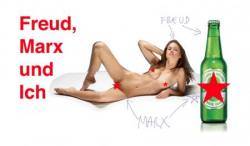
30.04.2016 - 11.06.2016
Freud, Marx und Ich
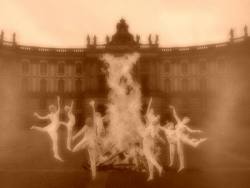
12.03.2016 - 23.04.2016
Tribe Fire

30.01.2016 - 05.03.2016
Andreas Fux | Стыд и Красота
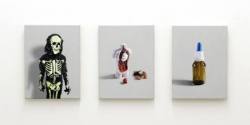
05.12.2015 - 23.01.2016
Dystopia/Fugen
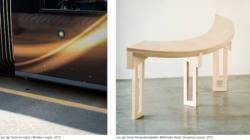
17.10.2015 - 28.11.2015
Lost in space

29.08.2015 - 10.10.2015
Talking Business
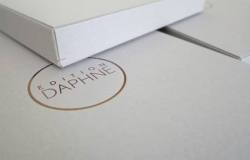
21.08.2015 - 23.08.2015
Edition DAPHNE
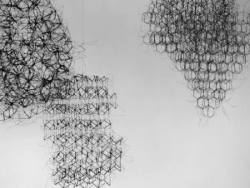
27.06.2015 - 08.08.2015
don't listen to the early birds